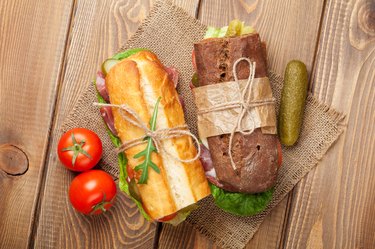
If you started a gluten-free diet because you developed stomach pain after eating products that contained wheat and you still have pain, you may have been misdiagnosed. If you haven't been clinically diagnosed by a doctor, you need to see a gastroenterologist to determine the cause of your stomach pain. Celiac disease, also called gluten intolerance, is commonly confused with a wheat allergy, notes MayoClinic.com. If you notice that only wheat products cause stomach pain, but a gluten-free diet hasn't helped, you may have another condition.
Wheat and Grain Allergy
Video of the Day
Talk with your doctor about being tested for a wheat allergy. Around 20 percent of people who are allergic to wheat are allergic to other grains, according to the Food Allergy Initiative. A gluten-free diet would have eliminated wheat from your diet, avoiding symptoms, such as stomach pain. You may be allergic to the other grains that you substituted to make your diet gluten-free. The most common grain alternatives used in a gluten-free diet include rice, corn, soy, buckwheat, millet, potato and tapioca. Your allergist may test you for these grain allergies as well.
Video of the Day
Identifiable Symptoms
If your stomach pain is related to a food allergy, you will develop identifiable symptoms after eating the food or ingredient you're allergic to. Food allergies will cause adverse reactions in various parts of the body. You may develop hives, eczema, skin rashes, wheezing, chest tightness, trouble breathing, shortness of breath, coughing, runny nose, nasal congestion, postnasal drip and facial swelling. Digestive symptoms may include vomiting, diarrhea, nausea, bloating and stomach pain.
Elimination Diet
An elimination diet helps you identify which foods are causing an adverse reaction after you eat them. If your doctor cannot diagnose you immediately, she may advise that you follow an elimination diet. Your doctor will recommend which foods you should eliminate for two weeks. After the two weeks end, you will be instructed to slowly add each food back into your diet, one at a time. Keep a food log that details the foods you eat and how they affect your body. Discuss your findings with your doctor.
Consideration
If modifying your diet does not alleviate your symptoms, your doctor may perform various tests to determine if you have a more serious condition, such as irritable bowel syndrome or Chrohn's disease. Pain from eating food may be related to various conditions and will be the most effectively diagnosed by a gastroenterologist.